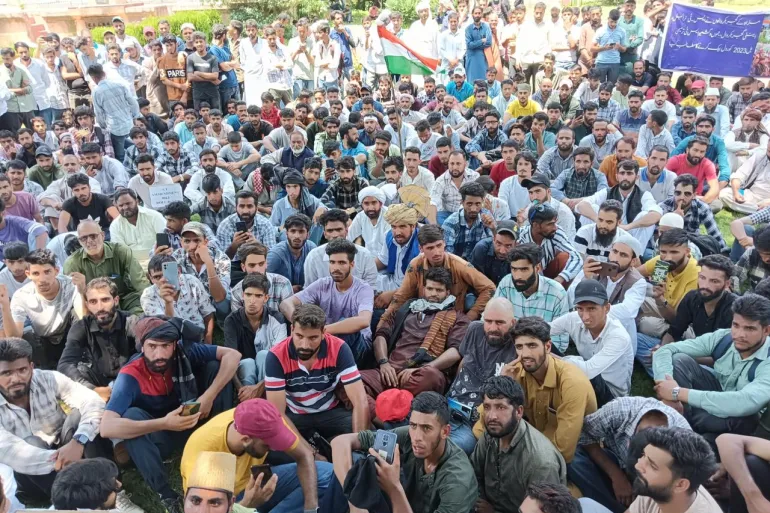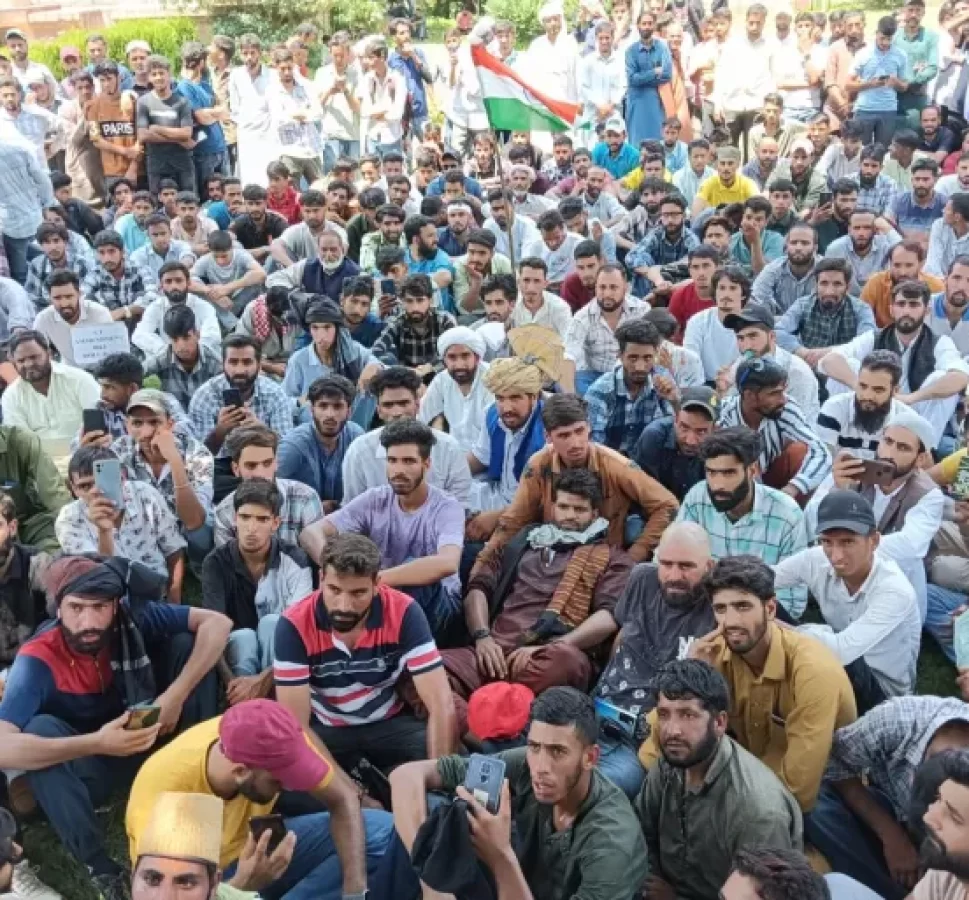
A new law granting tribal status to Paharis has angered the Gujjars and Bakarwals who fear losing constitutional rights — opening up caste divisions in an already tense region.
Tral, Indian-administered Kashmir – Like many people from his nomadic tribal community, Bashir Ahmed Gujjar, a 70-year-old shepherd, never went to school.
Poor and often on the move, formal education was not an option.
Things changed for the Gujjars, his community, after the government introduced quotas for what are known in India as Scheduled Tribes (STs), in state-run educational institutions and government jobs in 1991 as part of an affirmative action programme for historically marginalised groups. Gujjars were included in the beneficiaries.
Families decided to send their children to school and college. “My children, my nieces and nephews have all been fortunate enough to have received education because of the ST status bestowed on us by the government,” Bashir told Al Jazeera at his home in the region’s Pulwama district. He said his niece now works as a teacher in a government school in Tral because of the job quotas that Gujjars can avail.
Now, he fears the next generation of his community could lose out on those gains of the past three decades.
Earlier this month on February 6, Prime Minister Narendra Modi’s government passed a legal amendment to include another community, the Paharis, within the list of STs. At the time, federal Tribal Affairs Minister Arjun Munda said the law would not erode the education and job quotas currently available for existing tribes — but would add additional quotas for new communities.
But the government is yet to explain how it plans to do that, leading to fears among the Gujjars and Bakarwals, two major tribal communities originally covered by the affirmative action, that they will now need to split their benefits with the Paharis who have historically been seen as better off.
“We have no hope for the future. The government is giving our share of guarantees to others,” Bashir said.
The government move has sparked a wave of protests by Gujjar and Bakerwal community groups, demanding that the amendment be repealed. The move has also spawned caste divisions in a region already on the edge over other controversial moves by the Modi government in recent years.
The decision to add Paharis to the list of STs could affect the national elections, expected to be held between March and May.
‘Using reservation to sway Paharis’
The Paharis consist of Hindus and Sikhs – who mostly migrated from what is now Pakistan when the subcontinent was carved up during partition in 1947 – and a significant number of Muslims.
Constituting about 8 percent of the region’s 16 million people, nearly two-thirds of Paharis live in the Jammu area towards the south of Indian-administered Kashmir, while a few reside in forests in the north.
The current tensions are rooted in the events of 2019 when, in a sudden move, Modi’s Bharatiya Janata Party (BJP) government abolished the special status of the region and brought it under New Delhi’s direct rule.
Since then, the Gujjars and Bakarwals allege that the BJP has been trying to induct the Paharis into the ST category.
India’s affirmative action to uplift its historically marginalised groups – mainly underprivileged castes and Indigenous tribes – also includes a provision to reserve seats for them in legislative assemblies.
In Indian-administered Kashmir, also referred to as Jammu and Kashmir in official documents, state assembly seats for the Gujjar and Bakarwal communities were reserved in 2004.
Members of these two communities – who form about 10 percent of the region’s population – now allege that the BJP is trying to patronise the Paharis community for political benefits ahead of the general election.

More than 200km (124 miles) away from Tral, in Jammu, Javid Chohan, another Gujjar, said the government was trying to curb protests through a heightened police presence and internet blackouts.
“The BJP is using reservation to sway the region’s Pahari-speaking population to strengthen its Hindu vote bank in Jammu,” he told Al Jazeera. Unlike the Paharis, the Gujjars and Bakarwals of the region are predominantly Muslim.
Pro-India political parties also allege that the BJP is using the community to peddle its politics, like it did with its promise in its 2014 and 2019 election manifestos to resettle thousands of Kashmiri Hindus, called Pandits, displaced by the rise of an anti-India rebel movement in the late 1980s.
“First, they used Kashmiri Pandits to win the 2019 election. This time, the Paharis are being politicised. The BJP is pitting communities who have lived in harmony for centuries against each other,” Waheed Ur Rehman Para of the Peoples’ Democratic Party (PDP), told Al Jazeera. “They are stealing from one’s plate to feed the other.”
Naik Alam, an elected representative of the Gutroo village in Tral, said the BJP was “simply misusing” law to show that Hindus can also get a reservation in a Muslim-majority region.

What’s the BJP’s election game plan?
In the 90-member legislative assembly in Indian-administered Kashmir, the BJP, which predominantly relies on Hindu votes, has traditionally done well in the Jammu region, where Hindus are in the majority. But it has struggled to make political inroads in the Kashmir region, where Muslims are in majority.
Spanning Jammu and Kashmir are nine seats in the legislature that are reserved for STs. Critics of the BJP argue that winning these could help it secure an overall majority in the legislature: The state assembly elections are also expected to be held later this year.
In 2020, the federal government granted 4 percent reservation, as a linguistic minority, to the Paharis, who form the majority in at least 10 constituencies. If given the ST status, the group could contest the seats reserved for STs in the legislature and challenge the traditional dominance of Gujjars and Bakarwals in these sets. Gujjars and Bakarwals are predominantly Muslims, who rarely vote for the BJP.
Gujjar activist Guftar Ahmed Choudhary said the BJP’s move would backfire.
“We are protesting for our rights. Our youth leaders are being targeted and even pressured by the authorities to give up the movement… This is completely unconstitutional and the BJP will suffer in the coming elections,” Choudhary told Al Jazeera.

But according to BJP’s Kavinder Gupta, a former deputy chief minister of the region, reservations for the Paharis were long due. He alleged that Kashmiri political parties regarded the community as second-class citizens and ignored their development.
“We were only trying to bring the Paharis into the mainstream since they have always been sidelined by the Kashmiris,” Gupta told Al Jazeera.
Lawyer Ahsan Mirza, a member of the Pahari Tribe ST Forum, a group working for the welfare of the Paharis, said the community had been previously assured by the BJP of a place in the tribal quota.
Iqbal Hussain Shah, another Pahari activist in the Jammu district of Rajouri, echoed Gupta’s comments to argue that the Paharis were discriminated against for decades. He also suggested that even Muslim Paharis would now back the BJP, a Hindu-majority party.
“Gujjars and Bakerwals got the ST status in 1991 and the BJP got us this status finally, after three decades. All Paharis will definitely support the BJP in the upcoming election,” he said.
But Zahid Parwaz Choudhary, the head of the Gujjar-Bakarwal Youth Welfare Conference, sees a more sinister plan on the part of the BJP.
“Now that Paharis are declared as STs, the community would eat into the opportunities aimed at the social and economic empowerment of the Gujjars and Bakarwals,” he told Al Jazeera.
“It is simple: BJP knows it cannot secure many votes in Kashmir, so they are using the Paharis to cut the vote share of other political parties.”






